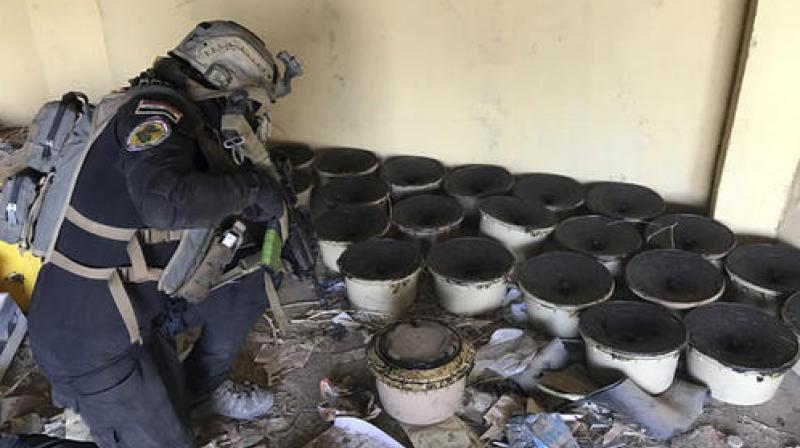Iraqi police battle suicide bombers in Mosul, get glimpse of life under ISIS

Shura, Iraq: Iraqi federal policemen stood over the corpse of an ISIS suicide bomber covered by a curtain. The chain attached to his ankle was tied to a car that had dragged him through streets, they said, that were once part of a self-proclaimed jihadist caliphate.
Nearby policemen fired AK-47 assault rifles in the air to mark their victory in Shura, one of dozens of villages captured as Iraqi forces press on with an offensive towards the nearby city of Mosul, the terrorists' main stronghold in the country.
But celebrations were mixed with curiosity and apprehension as security forces searched for clues on what makes the world's most violent and feared terror group tick.
"I shot two of the suicide bombers," said Ali Hashim. "One of them was running right at me. I could see him holding a cord up near his head as he ran. I shot him in time."
Federal policemen are part of the forces pressing ahead with an offensive to recapture Mosul from ISIS, in what will likely be the biggest battle in Iraq since a US-led invasion toppled Saddam Hussein in 2003 and unleashed turmoil.
Even if ISIS loses, Iraq faces the daunting challenge of making sure the assault on the predominantly Sunni Muslim city does not inflame sectarian tensions.
The top commander in the Shura area, Staff Major Hayman Abbas, was cautiously optimistic about seizing more villages and towns, even after his men killed seven suicide bombers in two days.
"My biggest worry is what I call the kamikaze suicide bomber. This is someone who is very efficient at shooting a lot of people during a battle and then blows himself up," he said.
Three suicide bombers lay in the centre of the village, their corpses burned to a deep black colour. One was sprawled out on a sidewalk, wearing the type of clothes that jihadists wear in Pakistan or Afghanistan.
Another was layed out in a sand lot. Dozens of bullet casings were scattered across the area. Foreign fighters who occupied the town included Yemenis and Saudis, senior police officers said.
Chechnyan militants also controlled the village, some of the most feared ISIS members because they are seen as the most fanatic and experienced.
One police officer saved a photograph he took of an official ISIS document granting a Chechnyan militant leave for three days.
Complaint Line
ISIS's initial appeal was its ability to function as a state that provided better services than Arab governments widely seen as corrupt.
So the group did its best in places like Shura to demonstrate that it is running a self-sufficient caliphate.
On a wall in the village is a huge sign urging people to use a complaint line to report anyone who is out of order.
"Dial landline 731007," said the sign, beside another one that states ISIS fighters fight for the people. Policemen also pointed to documents that require people to switch their Iraqi identification cards to ISIS ones.
A newsletter that had been distributed presents strict guidelines on beard length, and it also urges Muslims to give to charities.
One police officer, Alaa Hussein, said civilians who fled provided policemen with information about the militants that led to their defeat. Nevertheless, he was still edgy.
"Some of them may still be hiding in buildings," he said on the edge of the village, standing near a row of Howitzer artillery pieces on the desert floor.
In a town about an hour away by car, a plainclothes policeman was also taking no chances.
He stood an inch from a man's face and then slapped him with both hands, as an oil fire started by retreating ISIS terrorists filled the sky with thick, dark smoke.
The man, in his 20s, pleaded for mercy and proclaimed his innocence as he was asked if his father is a member of ISIS or whether he is one of its local leaders.
"He killed innocent people. He shot them," the interrogator told Reuters. The man was led away by soldiers.

